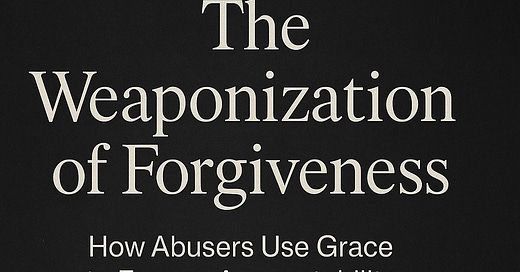How Abusers Use Grace to Escape Accountability
Forgiveness is sacred.
But in the hands of abusers, it becomes a weapon.
They use it to silence the wounded.
To avoid consequences.
To skip the hard work of change.
In authoritarian systems, forgiveness isn’t a path to healing.
It’s a pressure tactic.
A guilt trip.
A way to make you feel bad for being hurt.
We’re told to forgive quickly.
To move on.
To stop making people uncomfortable.
But that kind of forgiveness is counterfeit.
It doesn’t liberate the victim.
It protects the abuser.
Forgiveness Should Be Liberating—Not Mandatory
Forgiveness is meaningful only when freely chosen.
When it’s demanded, it becomes another form of control.
Too often, victims are told:
“You have to forgive to heal.”
“You can’t carry hate in your heart.”
“God forgave you—so you must forgive them.”
These aren’t invitations. They’re commands.
Commands that shame. Silence. Suppress.
Forgiveness isn’t a moral obligation.
It’s a deeply personal process.
And no one has the right to dictate the timeline.
True forgiveness happens after the harm is acknowledged.
After the truth is told.
After repair is attempted.
Not as a shortcut.
Not as a muzzle.
The Christian Forgiveness Trap
I was taught that forgiveness was unconditional.
That to withhold it was a sign of sin.
That my pain, my boundaries, my sense of justice—were obstacles to holiness.
But here's what I’ve come to see:
Too many Christian communities preach a forgiveness that prioritizes the comfort of the powerful over the healing of the wounded.
They don’t want reconciliation.
They want silence.
Survivors are told:
“Bitterness will rot your soul.”
“You’re just angry because you haven’t truly forgiven.”
“Forgive like Jesus forgave—instantly and without conditions.”
But this isn’t about Jesus.
It’s about control.
If I’m obligated to forgive you immediately—
you never have to feel the weight of what you did.
You never have to repair the damage.
You never have to grow.
And here's the most twisted part:
Forgiveness becomes the new sin if it isn’t fast enough, generous enough, spiritual enough.
So we stay in systems that harm us.
We swallow our truth.
We call it grace.
But what if true grace names the wound?
What if healing requires telling the truth—out loud, in full?
What if Jesus never meant for forgiveness to be used as a muzzle?
Too many churches use forgiveness as a tool of PR, not prophecy:
Reputation saved
Tithes protected
The accused restored to leadership
…while the survivor is forgotten.
Jesus didn’t comfort corrupt leaders.
He didn’t rush the bleeding woman.
He didn’t tell the oppressed to “move on.”
He told the truth.
He told stories that exposed power.
He flipped tables.
So if your theology demands I forgive before truth is told—
before change is shown—
before I feel safe—
That’s not holy.
That’s abuse dressed in religious language.
Abusers Know How to Play This Game
They’ve learned to mimic repentance.
They know what to say.
What posture to take.
What tears to summon.
They know that forgiveness can be fast-tracked—
if they look remorseful
without actually confronting the truth.
No naming what they did.
No specific apology.
No meaningful restitution.
Just vague language:
“Mistakes were made.”
“I’ve grown since then.”
“That’s not who I am anymore.”
Meanwhile, the victim is told to forgive quickly
or risk being labeled bitter.
To let it go—or be accused of sowing division.
Churches and institutions love a redemption arc.
They want the comeback story.
The restored leader.
They say:
“Let’s move forward.”
“Let’s not dwell in the past.”
That only works if you weren’t the one hurt.
If the harm didn’t leave a scar on your soul.
This isn’t grace.
It’s gaslighting.
When we reward image over integrity—
when we platform apologies without change—
we don’t build a culture of forgiveness.
We build a culture of repeat offenders.
Reclaiming Forgiveness Without Losing Justice
Forgiveness can be sacred.
But only when paired with truth.
Not a shortcut.
Not a silence.
Not a shield.
Forgiveness does not mean:
Restoring someone to power
Ignoring boundaries
Pretending the harm wasn’t that bad
It does not mean abandoning consequences.
It does not mean reconciling with unrepentant people.
It certainly doesn’t mean healing on someone else’s timeline.
At its best, forgiveness is the release of your right to revenge—
not your right to justice.
You don’t owe reconciliation.
You don’t owe silence.
You don’t owe anyone your healing.
That belongs to you.
You can forgive and still demand accountability.
You can forgive and still walk away.
You can forgive and still tell the truth.
Because forgiveness that hides the truth isn't holy.
It’s just another form of control.
What True Forgiveness Looks Like
It centers the survivor, not the abuser
It happens after accountability, not instead of it
It invites transformation—not a cover-up
It tells the truth, even when it’s uncomfortable
Peaceful resistance means refusing to weaponize spiritual language for control.
It means reclaiming forgiveness as a healing act—not a tool of shame.
Because justice isn’t the enemy of grace.
It’s the soil grace grows from.




